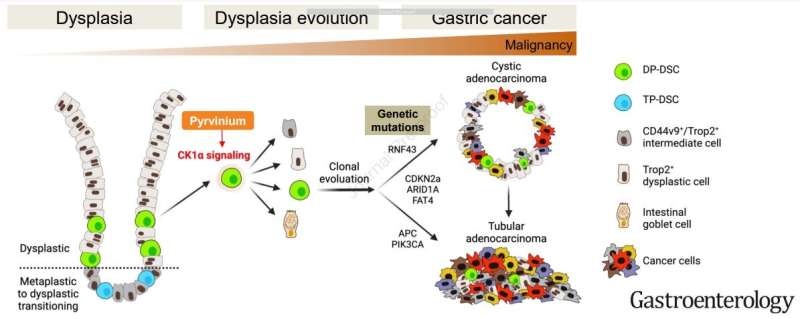
A recently published study reveals new insights into how gastric cancer develops and suggests a preventive treatment.
Eunyoung Choi, Ph.D., assistant professor of Surgery, and colleagues identified for the first time that Trop2+/CD133+/CD166+ dysplastic stem cells are a key source of clonal evolution of dysplasia to multiple types of gastric cancer. Their investigation further showed that pyrvinium, a commonly prescribed treatment for intestinal pinworms, blocked regeneration of dysplastic stem cells by controlling the CK1a signaling protein in mouse models and in human organoids.
Their findings were published online June 11 in Gastroenterology.
“The dysplastic stem cells that we identified are de novo stem cells first present during carcinogenic transition of pre-cancerous metaplasia to dysplasia in both mouse and human stomachs. Our study also demonstrated cell fate dynamics and evolutionary process of dysplastic stem cells as a single-type of non-cancerous stem cells in dysplasia and provided a clue, which explains full spectrum of a carcinogenic cascade, normal-metaplasia-dysplasia-adenocarcinoma, during gastric cancer development,” said Choi, the study’s corresponding author.
Globally, gastric cancer is the fifth most common cancer and the third deadliest. Dysplasia, the abnormal growth or development of cells, carries a high risk for progression to gastric cancer, but the cellular mechanisms that cause these cells to develop into cancer are not understood. Vanderbilt University Medical Center researchers are investigating this process and have published a series of studies on the subject.
In this latest study, they conducted transcriptome analysis utilizing dysplastic organoids from active KRAS gene-induced mouse stomachs. They examined cell heterogeneity and genetic alterations that occurred during clonal evolution utilizing next-generation sequencing.
“Stemness and plasticity of dysplastic stem cells led to the sequential progression of gastric adenocarcinomas and recapitulated tumor heterogeneity and genetic alterations observed in human gastric cancers,” said Jimin Min, Ph.D., the study’s first author, who is a postdoctoral fellow working in the Choi Laboratory at VUMC.
Source: Read Full Article
